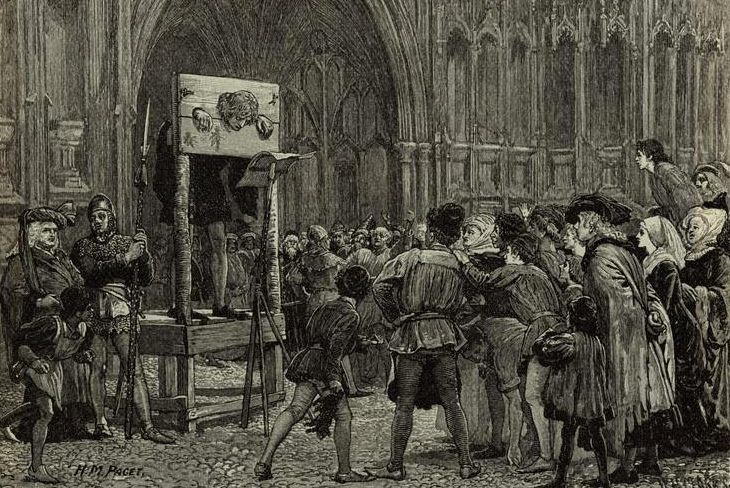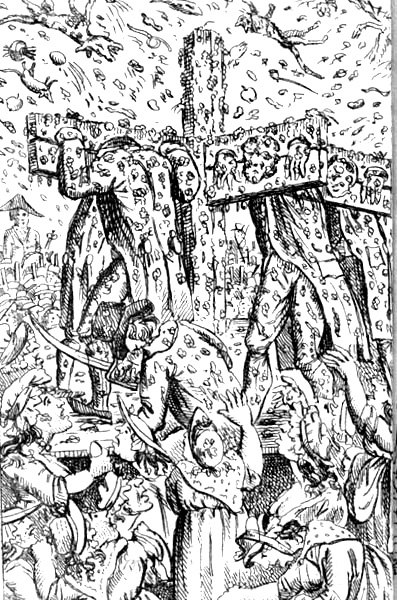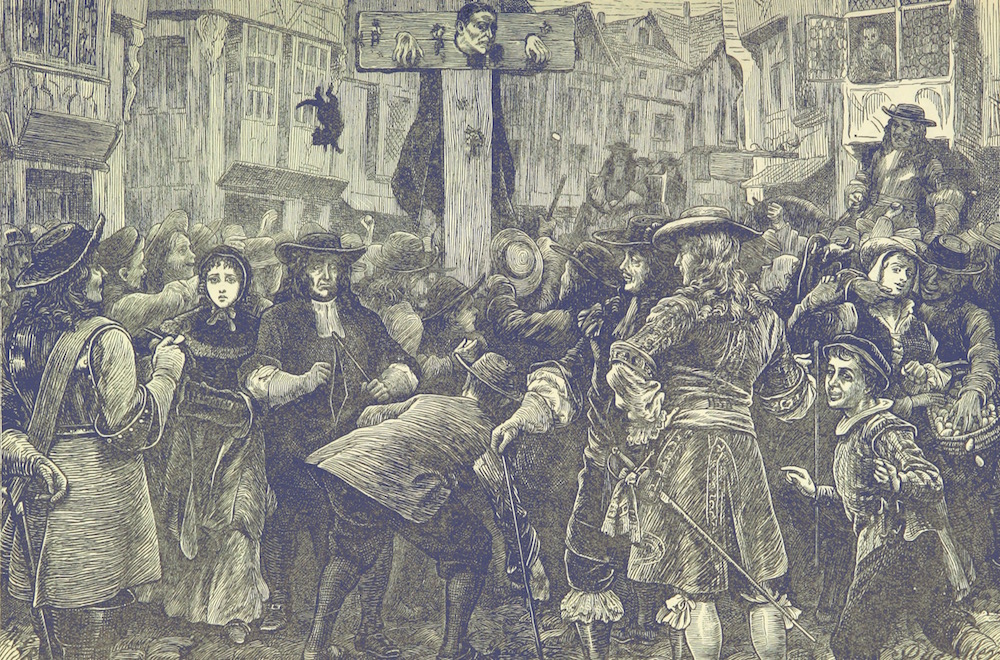What do you do when your PCs break the law? In-world actions must have in-world consequences if player choice is to be meaningful, but most in-world punishments make poor gaming. For example, prison is usually resolved with a flash forward, so it doesn’t feel ‘real’. Fines (and confiscation of property) strip the player of toys she’s worked hard for, even though her character did wrong, not her. Instead, let’s have a look at the pillory, an antiquated form of British social punishment that feels meaningful, but punishes only the character, not the player.

A pillory is a pair of hinged wooden boards, typically with three holes. The offender placed his head and hands in the holes, and the boards were locked together. Sometimes multiple pairs of boards were attached to a rotating central shaft so several offenders could be punished at once while walking in a circle. The pillory was usually on a wooden platform in a public place.
Pillorying was a form of public shaming. Word got around quickly when someone was being pilloried. Large crowds would come out to jeer and curse at the offender being punished. Most sentences lasted an hour, beginning at noon when the streets were packed with workers getting lunch. Pillorying guaranteed that all the neighborhood knew the prisoner’s crime. It was a humiliating experience.

One of the most important features of the pillory experience was the crowd throwing things at the condemned. Constables formed a ring around the platform to keep the crowd from tearing the prisoner apart, but other than that, the constables didn’t interfere. The diary of Francis Plane records how the audience would come to the pillory armed with things to throw. “Some of these people brought with them on donkeys, and in baskets, rotten eggs, which they procured from the egg warehouses, decayed cabbages, etc, etc. the refuse of Covent Garden Market.”
The audience was often revoltingly creative with what they threw. If you didn’t bring your own dead rats, you could sometimes buy some from one of the women standing in the square with baskets of throwable garbage for sale. Some accounts even record live cats being thrown. A particular favorite was the mixture of hay, manure, and horse urine that collected on the floors of stables. This goop would sometimes accumulate on a prisoner so heavily that it obscured his face, and a constable had to mount the platform to knock the stuff off so he could breathe.

If your PCs get caught breaking some law and you decide to punish them with the pillory, here are some fun things you can do with the experience:
– The day before the sentence is carried out, ask the players if they want to gin up a plan. They may bribe guards to shorten their hour or organize their friends to use wagons to block access to the pillory square.
– Put important NPCs in the crowd: enemies, lovers, crushes, mentors, friends. Have petty rivals show up with baskets of rotten fruit and vegetables.
– If you have players who enjoy soliloquies or voicing their character’s inner monologue, ask them what’s going through their character’s mind during this desperately humiliating experience.
– If the PCs have loyal friends, those friends may try to disperse the crowd, with or without success.
– There are multiple cases of prisoners having their ears cut off by guards while in the pillory. Maybe one of the constables has a grudge against the PCs and wants to scare them, so he mounts the steps with a drawn knife. Streetwise PCs know what he’s threatening. Do they plead with him? Try to break free? Or do they keep quiet, denying the constable the satisfaction of seeing them struggle?
– When the ordeal is over, consider having some friendly NPCs take the PCs home, fix them a hot meal, and give them a chance to recover. After such serious public humiliation, this small kindness may mean a great deal.
If the pillory experience goes as planned, the PCs’ faces and crimes will be known throughout the city. If they weren’t widely known before, they will be now. When the party meets a stranger, consider rolling to see if she was in the crowd and recognizes them. Even if she doesn’t know the party by face, she may know them if someone else points them out (“Those are the sods who were pilloried for thieving three months back!”) Upstanding NPCs will be less willing to work with the party, or at least may require more persuading. Low-life NPCs may see the PCs as kindred spirits, or they may see the party as a bunch of saps dumb enough to get caught.






